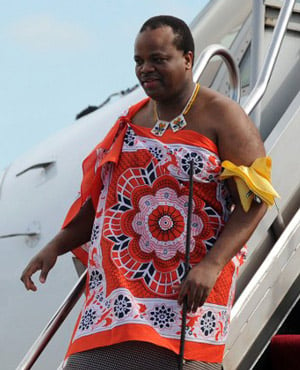
Mswati III is a rand billionaire. When his jet was seized for millions in debt, it opened a window into how he makes so much money.
As soon as King Mswati III saw his royal jet, “a broad, endless smile” spread across his face.
This was the account provided – by Swaziland’s Observer newspaper – of the moment, last month, when the King’s McDonnell Douglas MD87 finally touched down at Matsapha International Airport in Swaziland after being out of the king’s reach for more than four months.

The luxury plane had been seized by a sheriff in Canada in January after a court application brought by a Malaysian businessman who claimed that the king had failed to pay him a long-outstanding debt of $3.5m (R44m at the current exchange rate) for luxury upgrades to the jet.
It took a delegation of diplomats and lawyers to negotiate the plane’s release, and last month a Canadian court ruled the king could have his plane back if the government of Swaziland coughed up $3.5m in surety.

On Friday, they will be back in the Canadian court to fight the case.
Until recently, 39-year-old Malaysian businessman Shanmuga “Shan” Rethenam considered himself the king’s personal friend. But his fortunes have change dramatically. Where once he enjoyed police escorts in Swaziland, he is now terrified to return to the kingdom after he was threatened with extradition and arrest for allegedly mismanaging a once-lucrative iron ore mine in the country.
The fallout has provided a rare glimpse into Mswati’s secretive business dealings – a world of questionable deals, broken promises, luxury gifts, bribery and betrayal.
The $20m 'gift'
Mswati’s MD87 started its career in 1991 with a Japanese airline. By the time Mswati received it in April 2012, it had undergone a makeover. The economy class seats were ripped out and replaced with wood panelling, a double bed and plush seats.

The price tag: roughly $20m.
When Swazi Prime Minister Sibusiso Dlamini announced in 2012 the king had received a new plane, questions (and eyebrows) were raised about who had footed the bill. At the time, all the government would say was that it had been “a gift… from development partners and friends”.

What has emerged in court papers and leaked documents is that Rethenam sold the plane to the king in 2010 for $11.45m. The first $10 million was paid by a foreign government, which emails suggest was Kuwait, and another $4.5m was paid by the king’s company, Inchatsavane, of which he is the sole shareholder. When he received it, the plane was a gutted shell and $6m was needed to kit it out.
A “misunderstanding” with the “other government” resulted, Rethenam said, in a funding shortfall. “The king called me and said: ‘Shan, we have a situation here, how do we solve it?’”
Rethenam struck a lease and buy-back agreement with an investment company to put up $7.5m to deck out the plane. In the interim, Rethenam loaned the king a 16-seater jet, although he claims he had to replace it with a larger one when the king complained that, with only one bathroom, it was inconvenient.
At the time, Rethenam wanted a licence for a lucrative iron ore mine 20km outside the Swazi capital, Mbabane. Ngwenya Mine was previously operated by Anglo American but closed down in the 1970s. By 2011, new recovery technologies and strong iron ore prices of more than $170 per ton made it a valuable asset. By June, Rethenam was granted a seven-year licence to start reprocessing old mine dumps. His company took a 50% stake in the new venture, Salgaocar Swaziland; 25% was given to the government of Swaziland; and 25% was given to the king “in trust for the Swazi nation”.
It is not unusual for the king to be cut in on deals – the Mines and Minerals Act of 2011 requires that the King be given a 25% stake free of charge in any mining deal. In 2012, Forbes estimated his personal wealth was in excess of $100 million.
Asked how whether his dealings with the king might be considered bribery, Rethenam told City Press this week: “If you give somebody in power or position money, it’s called bribery. But this is a head of state, and it’s common for the king to be part of a deal.
“Look, this is the custom in Swaziland; this is how things are done, unfortunately. So I don’t know. Some people might call it a bribe, but for me it was not a bribe.”
Meanwhile, the king’s unfinished MD87 was still in Canada. Court papers show the company hired to refurbish it ran into financial trouble and asked for more money. The king once again asked him for help, Rethenam claims.
“I remember the king said: ‘I don’t have money.’ And this is where a lot of people don’t understand; you go to the king and there’s nothing written ... it’s not like you are making a contract,” he said.
“So I said to the king: ‘Your Majesty, I will fund [the plane] … However, I’m putting up this money and I need this money to be paid back.’ So the king said: ‘Shan, no problem, when the plane is delivered, I will pay your money.’”
Rethenam paid for the plane’s completion, and this is the $3.5m debt he is now trying to claim through Canadian courts.
By April 2012, the plane was ready to be delivered. But to buy the plane back from the investment company, Mswati needed $9.5m.
“The king came to me, saying ‘Shan, I need money again’,” Rethenam said. “I said: ‘Your Majesty, what do you mean? You had all the time and I’m already paying for the overrun … What do you want me to do?’
“He said: ‘Yeah, but I need to pay for the aircraft.’”
The solution they came up with was that the new iron ore mine would grant the king a $10m loan, offset against future dividends.
“If I did not come and rescue this, [the king] would have been in much bigger trouble,” said Rethenam. “The guys who had financed the plane would have seized this plane, and ... sold it.”
On April 19 2012, the king’s 44th birthday, his company, Inchatsavane, became the registered owner of the plane. “It was delivered to the king and he was very happy about it and, in fact, the relationship strengthened a lot,” said Rethenam. “The day I delivered the plane ... he asked me to marry one of his daughters.” Rethenam said he declined the offer because he was already engaged.

At that stage, Rethenam didn’t push the king to repay the $3.5 million spent on refurbishments. “There was a commodities boom, I was doing extremely well,” he says. “$3.5m was peanuts to me... I used to fly in my own private jet; I used to have two of my own planes.” But as iron ore prices fell, so did Rethenam’s fortunes.
Iron brew
When the $10m loan was given to the king in April 2012, iron ore was selling at $147 per ton. By May 2013, it had dropped to $124. By May 2014, it was $100. On April 2 this year, prices hit a record low of $47 per ton.
Despite this, Ngwenya Mine continued to produce, and in 2012/13 exported iron ore worth $94m. Miners were paid the minimum wage.
“The working conditions were horrible,” said Wonder Mkhonza, secretary-general of the Amalgamated Trade Union of Swaziland. “A person will get sick and he will go to the Mbabane government hospital, but the hospital was instructed not to book people off – even injured people were told to go to work.”
Mkhonza says that when workers tried to join the union they were dismissed.
“The mine was viewed as a direct business for the king,” he says. “Even the department of labour did not want to touch the mine. It was a sacred cow.”
Rethenam denies this, saying they were employed through a labour-broking company: “I gave all the workers the best I could. I paid bonuses and gave good food, like KFC and Nando’s, whenever I was there.”
What happened next could become the subject of international arbitration before the World Bank’s International Centre for Settlement of Investment Disputes (Icsid).
Government’s version of events is that, as iron ore prices dropped, contractors went unpaid, and the Port of Maputo seized 50 000 tons of ore for unpaid debts. Rethenam was asked to inject cash into the mine, but refused. The mine had to be liquidated. Late last year, Ngwenya Mine closed and 400 Swazi miners lost their jobs.
But in a notice of dispute filed with the Icsid in January, Rethenam’s company accused the government of Swaziland of engineering an “artificial cash crisis” to enable the king to seize the mine and avoid repaying the loan.
Rethenam claims that, in August 2014, the king’s private secretary halted all exports of iron ore, ordering that it be stockpiled instead.
With no money coming in or ore going out, he asked the king to repay the loan, but he refused, and the company inevitably collapsed.
“The mine is no longer functioning; all workers were sent home,” said Mkhonza. “The price of the iron ore – yes – that was the official position. Personally, I think the decision was taken to close the mine because of the relationship that soured.”
Rethenam now wants the kingdom to pay him $141m (R1.75bn) in compensation for the loss of the mine.
In a letter to Dlamini in January 2015, Rethenam says: “I am extremely shocked and heartbroken with the change in circumstances, and cannot come to terms with the manner in which events are unfolding … Is this how one is to be treated after all I have done?”
This includes negotiating “a crude oil transaction with Equatorial Guinea”, “providing loans/advances to His Majesty the King to purchase luxury goods from overseas”, including $1.5 million for art bought in New York and “paying the entire expenses for Her Majesty [the] Queen Mother’s medical treatment in Singapore”, totalling almost $400 000. “I have at all times tried to save us all from the discomfort and embarrassment that arises from litigation, and public disclosure of information,” he wrote.
He added: “Disclosure of past events will paint a very negative image of the country to potential investors, but at this point it appears that I have no other alternatives.”
Rethenam instructed his lawyers to approach the Canadian courts to seize the plane because he “wanted the king to focus his attention on me”.
In an affidavit before court, the king’s private secretary and royal estate manager, Sihle Dlamini, denied that the king or his company was responsible for the debt, saying they had never agreed to repay the costs and that Rethenam’s claim had been filed too late.
Rethenam still holds out hope that the king will allow him to return to Swaziland to reopen the mine.
“This time, if I go in, I’ll put in many conditions … This time, even if I go in, I’m going to stay far away from the king.”
City Press put detailed questions to both the government of Swaziland’s spokesperson and the king’s private secretary.
Spokesperson Percy Simelane said: “The matter is still pending before a court of law in Canada. It is sub judice and we would be in contempt if we responded to your questions since they require that we bring up the merits of the case.”
Click here for more on this story, including pictures and court documents.
Note: This story has been updated. The original story failed to mention that the Mines and Minerals Act of 2011 requires the King to hold a 25% stake in the mine. It also failed to accurately reflect the question that had been put to Rethenam regarding the bribery allegation.




 Publications
Publications
 Partners
Partners








